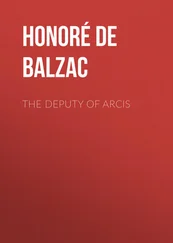Eugenie gave no thought to these rarities, nor to her father’s mania for them, nor to the danger she incurred in depriving herself of a treasure so dear to him; no, she thought only of her cousin, and soon made out, after a few mistakes of calculation, that she possessed about five thousand eight hundred francs in actual value, which might be sold for their additional value to collectors for nearly six thousand. She looked at her wealth and clapped her hands like a happy child forced to spend its overflowing joy in artless movements of the body. Father and daughter had each counted up their fortune this night,—he, to sell his gold; Eugenie to fling hers into the ocean of affection. She put the pieces back into the old purse, took it in her hand, and ran upstairs without hesitation. The secret misery of her cousin made her forget the hour and conventional propriety; she was strong in her conscience, in her devotion, in her happiness.
As she stood upon the threshold of the door, holding the candle in one hand and the purse in the other, Charles woke, caught sight of her, and remained speechless with surprise. Eugenie came forward, put the candle on the table, and said in a quivering voice:
“My cousin, I must beg pardon for a wrong I have done you; but God will pardon me—if you—will help me to wipe it out.”
“What is it?” asked Charles, rubbing his eyes.
“I have read those letters.”
Charles colored.
“How did it happen?” she continued; “how came I here? Truly, I do not know. I am tempted not to regret too much that I have read them; they have made me know your heart, your soul, and—”
“And what?” asked Charles.
“Your plans, your need of a sum—”
“My dear cousin—”
“Hush, hush! my cousin, not so loud; we must not wake others. See,” she said, opening her purse, “here are the savings of a poor girl who wants nothing. Charles, accept them! This morning I was ignorant of the value of money; you have taught it to me. It is but a means, after all. A cousin is almost a brother; you can surely borrow the purse of your sister.”
Eugenie, as much a woman as a young girl, never dreamed of refusal; but her cousin remained silent.
“Oh! you will not refuse?” cried Eugenie, the beatings of whose heart could be heard in the deep silence.
Her cousin’s hesitation mortified her; but the sore need of his position came clearer still to her mind, and she knelt down.
“I will never rise till you have taken that gold!” she said. “My cousin, I implore you, answer me! let me know if you respect me, if you are generous, if—”
As he heard this cry of noble distress the young man’s tears fell upon his cousin’s hands, which he had caught in his own to keep her from kneeling. As the warm tears touched her, Eugenie sprang to the purse and poured its contents upon the table.
“Ah! yes, yes, you consent?” she said, weeping with joy. “Fear nothing, my cousin, you will be rich. This gold will bring you happiness; some day you shall bring it back to me,—are we not partners? I will obey all conditions. But you should not attach such value to the gift.”
Charles was at last able to express his feelings.
“Yes, Eugenie; my soul would be small indeed if I did not accept. And yet,—gift for gift, confidence for confidence.”
“What do you mean?” she said, frightened.
“Listen, dear cousin; I have here—” He interrupted himself to point out a square box covered with an outer case of leather which was on the drawers. “There,” he continued, “is something as precious to me as life itself. This box was a present from my mother. All day I have been thinking that if she could rise from her grave, she would herself sell the gold which her love for me lavished on this dressing-case; but were I to do so, the act would seem to me a sacrilege.” Eugenie pressed his hand as she heard these last words. “No,” he added, after a slight pause, during which a liquid glance of tenderness passed between them, “no, I will neither sell it nor risk its safety on my journey. Dear Eugenie, you shall be its guardian. Never did friend commit anything more sacred to another. Let me show it to you.”
He went to the box, took it from its outer coverings, opened it, and showed his delighted cousin a dressing-case where the rich workmanship gave to the gold ornaments a value far above their weight.
“What you admire there is nothing,” he said, pushing a secret spring which opened a hidden drawer. “Here is something which to me is worth the whole world.” He drew out two portraits, masterpieces of Madame Mirbel, richly set with pearls.
“Oh, how beautiful! Is it the lady to whom you wrote that—”
“No,” he said, smiling; “this is my mother, and here is my father, your aunt and uncle. Eugenie, I beg you on my knees, keep my treasure safely. If I die and your little fortune is lost, this gold and these pearls will repay you. To you alone could I leave these portraits; you are worthy to keep them. But destroy them at last, so that they may pass into no other hands.” Eugenie was silent. “Ah, yes, say yes! You consent?” he added with winning grace.
Hearing the very words she had just used to her cousin now addressed to herself, she turned upon him a look of love, her first look of loving womanhood,—a glance in which there is nearly as much of coquetry as of inmost depth. He took her hand and kissed it.
“Angel of purity! between us two money is nothing, never can be anything. Feeling, sentiment, must be all henceforth.”
“You are like your mother,—was her voice as soft as yours?”
“Oh! much softer—”
“Yes, for you,” she said, dropping her eyelids. “Come, Charles, go to bed; I wish it; you must be tired. Good-night.” She gently disengaged her hand from those of her cousin, who followed her to her room, lighting the way. When they were both upon the threshold,—
“Ah!” he said, “why am I ruined?”
“What matter?—my father is rich; I think so,” she answered.
“Poor child!” said Charles, making a step into her room and leaning his back against the wall, “if that were so, he would never have let my father die; he would not let you live in this poor way; he would live otherwise himself.”
“But he owns Froidfond.”
“What is Froidfond worth?”
“I don’t know; but he has Noyers.”
“Nothing but a poor farm!”
“He has vineyards and fields.”
“Mere nothing,” said Charles disdainfully. “If your father had only twenty-four thousand francs a year do you suppose you would live in this cold, barren room?” he added, making a step in advance. “Ah! there you will keep my treasures,” he said, glancing at the old cabinet, as if to hide his thoughts.
“Go and sleep,” she said, hindering his entrance into the disordered room.
Charles stepped back, and they bid each other good-night with a mutual smile.
Both fell asleep in the same dream; and from that moment the youth began to wear roses with his mourning. The next day, before breakfast, Madame Grandet found her daughter in the garden in company with Charles. The young man was still sad, as became a poor fellow who, plunged in misfortune, measures the depths of the abyss into which he has fallen, and sees the terrible burden of his whole future life.
“My father will not be home till dinner-time,” said Eugenie, perceiving the anxious look on her mother’s face.
It was easy to trace in the face and manners of the young girl and in the singular sweetness of her voice a unison of thought between her and her cousin. Their souls had espoused each other, perhaps before they even felt the force of the feelings which bound them together. Charles spent the morning in the hall, and his sadness was respected. Each of the three women had occupations of her own. Grandet had left all his affairs unattended to, and a number of persons came on business,—the plumber, the mason, the slater, the carpenter, the diggers, the dressers, the farmers; some to drive a bargain about repairs, others to pay their rent or to be paid themselves for services. Madame Grandet and Eugenie were obliged to go and come and listen to the interminable talk of all these workmen and country folk. Nanon put away in her kitchen the produce which they brought as tribute. She always waited for her master’s orders before she knew what portion was to be used in the house and what was to be sold in the market. It was the goodman’s custom, like that of a great many country gentlemen, to drink his bad wine and eat his spoiled fruit.
Читать дальше












